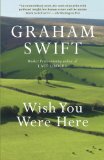Summary | Excerpt | Reviews | Beyond the book | Read-Alikes | Genres & Themes | Author Bio

A brief, lyrical novel with a powerful emotional charge about three wars of the twentieth century and an ever-deepening marriage.
A brief, lyrical novel with a powerful emotional charge, Rules for Old Men Waiting
is about three wars of the twentieth century and an ever-deepening marriage. In
a house on the Cape "older than the Republic," Robert MacIver, a historian who
long ago played rugby for Scotland, creates a list of rules by which to live out
his last days. The most important rule, to "tell a story to its end," spurs the
old Scot on to invent a strange and gripping tale of men in the trenches of the
First World War.
Drawn from a depth of knowledge and imagination, MacIver conjures the
implacable, clear-sighted artist Private Callum; the private's nemesis Sergeant
Braddis, with his pincerlike nails; Lieutenant Simon Dodds, who takes on Braddis;
and Private Charlie Alston, who is ensnared in this story of inhumanity and
betrayal but brings it to a close.
This invented tale of the Great War prompts MacIver's own memories of his role
in World War II and of Vietnam, where his son, David served. Both the stories
and the memories alike are lit by the vivid presence of Margaret, his wife. As
Hearts and Minds director Peter Davis writes, "Pouncey has wrought an
almost inconceivable amount of beauty from pain, loss, and war, and I think he
has been able to do this because every page is imbued with the love story at the
heart of his astonishing novel."
On the whole the reviewers praise Rules For Old Men Waiting for its depth and lyricism, but some felt that Pouncey over reached himself at times, pushing his points too hard, and that the story lacked drama (essentially it is the story of an old man in an old house with his memories). If you enjoy spare, elegantly written stories that take time to tell then this might well be one for you...continued
Full Review
(249 words)
This review is available to non-members for a limited time. For full access,
become a member today.
(Reviewed by BookBrowse Review Team).
Peter Pouncey was born in Tsingtao, China of English parents. At the end of World War II, after several dislocations and separations, the family reassembled in England, where he completed his classical education at boarding school and at Oxford University. In 1964 he was offered a job for one year as a classicist, filling in for a professor on sabbatical leave at Fordham University, and has been in America ever since - first at Fordham and then at Columbia University from 1967-1984 (he was dean of the ...
This "beyond the book" feature is available to non-members for a limited time. Join today for full access.

If you liked Rules for Old Men Waiting, try these:

by Graham Swift
Published 2013
A hauntingly intimate, deeply compassionate story about things that touch and test our human core, Wish You Were Here also looks, inevitably, to a wider, afflicted world. Moving toward a fiercely suspenseful climax, it brilliantly transforms the stuff of headlines into heart-wrenching personal truth.

by John Banville
Published 2006
A luminous novel about love, loss, and the unpredictable power of memory. Winner of the 2005 Booker Prize.
It was one of the worst speeches I ever heard ... when a simple apology was all that was required.
Click Here to find out who said this, as well as discovering other famous literary quotes!